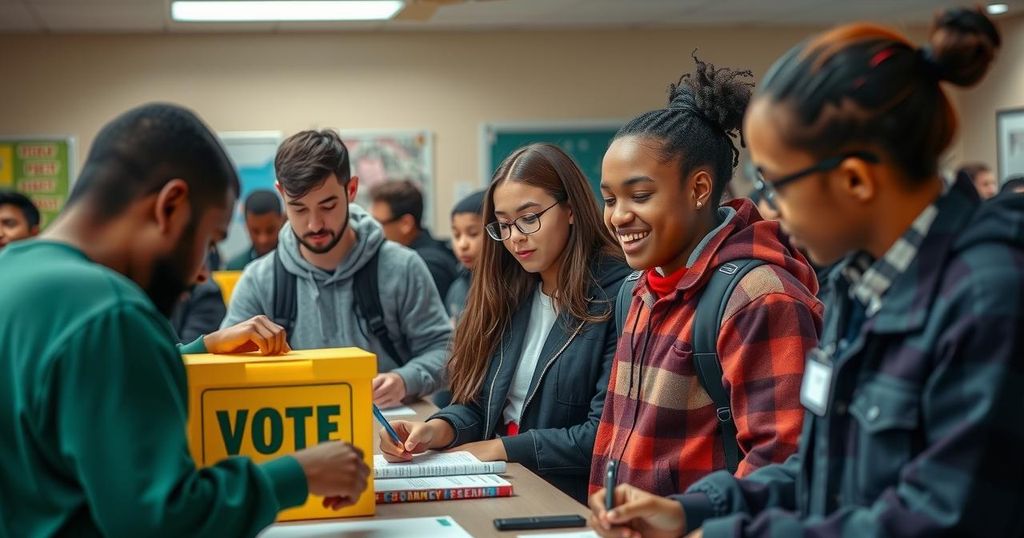CMS High Schoolers Participate in Election for Student Advisor to the Board of Education
As North Carolina continues its early voting period, Charlotte-Mecklenburg Schools high school students are participating in the election for the 2025 student advisor to the Board of Education. Ten students have been shortlisted, and all students in grades nine to twelve are eligible to vote. This position fosters communication between students and the board, although the advisor does not hold voting rights. The increased number of applications indicates a growing engagement among students in educational governance.
As early voting progresses in North Carolina, students from Charlotte-Mecklenburg Schools (CMS) are actively participating in the electoral process by casting their votes in the election for the 2025 student advisor to the Charlotte-Mecklenburg Board of Education. A total of ten students, including eight juniors and two sophomores, have been selected as finalists for this prestigious role. All CMS students in grades nine through twelve are eligible to vote for the upcoming advisor, with voting scheduled from October 21 to November 5, coinciding with Election Day. While these students are participating in a school election, it is critical to note that only those aged eighteen or older may vote in the presidential, state, and local elections. The student advisor position was established in 2016 to facilitate a connection between the student body and the Board, allowing student concerns to be communicated effectively. Though the advisor attends board meetings and offers insight, they do not possess voting rights. The selected student advisor will also act as an officer of the Charlotte-Mecklenburg Youth Council, collaborating with local governments and organizations such as Generation Nation, and will serve from January through December of the election year. The current student advisor, Ailen De Bonis, a senior at Ardrey Kell High School, expressed enthusiasm about her role and the increased interest in the position, which has seen a 59% rise in applications, growing from 93 in 2023 to 148 in 2024. Notably, this year marks the first instance when students from every comprehensive high school in the district applied for the position. Dee Rankin, vice-chair of the Board of Education and a member of the finalist selection committee, highlighted the importance of the student advisor, stating, “The student advisor plays an important role in Board thinking and decisions. We are pleased that the push to attract a large pool of candidates was successful and that students saw this as a real opportunity to help inform Board decisions through their student perspective.” Highlighting the finalists, Gabriel Guerra Barceló, an 11th grader at Charlotte Engineering Early College, emphasized his commitment to advocating for minority students and enhancing communication between the board and students. Quinten Canty, also an 11th grader at West Charlotte High School, aims to empower underrepresented students. Each finalist has articulated unique perspectives and priorities, ranging from improving safety and inclusivity in schools to advocating for better communication and resources for all students. This initiative by CMS demonstrates a commitment to engaging young people in the democratic process, fostering a sense of responsibility and advocacy among students for their educational environment.
The election for the student advisor to the Charlotte-Mecklenburg Board of Education serves as a significant opportunity for high school students to engage in the democratic process while voicing their concerns. Since its inception in 2016, this role has aimed to bridge the gap between students and decision-makers in education. The increase in applications reflects the growing awareness and interest among students to influence policies that affect their schooling and overall educational experience. Through their contributions, students not only gain firsthand experience in governance but also ensure their voices are heard on key issues within the school district.
In conclusion, the election of the student advisor represents an essential avenue for CMS high school students to have a tangible impact on the educational policies that shape their experiences. By participating in this election, students learn the value of civic engagement while also advocating for necessary changes within their school system. The increased interest in applications signals a promising trend toward greater student involvement and representation in educational governance.
Original Source: www.charlotteobserver.com




Post Comment